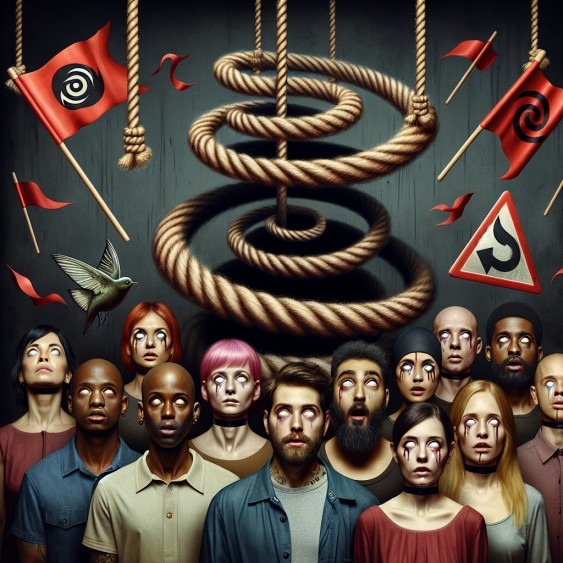
Introduction to Mob Mentality Games
Updated Jan 31, 2024
Mob mentality in games is a phenomenon where group players abandon their critical thinking skills and adopt a herd mentality. This can lead to players conforming to the group’s behaviour and opinions, even if they don’t necessarily agree. Mob mentality in games can be observed in various contexts, from online multiplayer games to in-person gaming events.
One of the most notable examples of mob mentality in games is the “raid culture” in massively multiplayer online games (MMOs). In these games, players form groups to take on challenging content, such as boss battles or dungeons. However, if a player is perceived as not meeting the group’s expectations, they may be ostracized or even kicked out. This can create a sense of pressure to conform to the group’s behaviour and opinions, even if it goes against the player’s values and beliefs.
Another example of mob mentality in games is the toxicity in online gaming communities. Players may engage in cyberbullying, harassment, or other negative behaviours, often due to feeling anonymous and detached from the consequences of their actions. This can create a toxic environment that can be difficult for individual players to navigate.
To avoid being influenced by mob mentality in games, players can stay aware of their values and beliefs and make decisions based on them rather than blindly following the group. Game developers can also play a role in preventing mob mentality from taking hold in their games. They can encourage positive behaviour through game mechanics, such as rewarding players for helping others or penalizing players for engaging in negative behaviour. They can also establish clear guidelines and boundaries for player behaviour and enforce them consistently.
What Are Mob Mentality Games?
games, also known as groupthink or herd behaviour, refer to how people behave differently when in a group instead of when they are alone. This phenomenon has been studied in various contexts, from political protests to online gaming.
In online gaming, mob mentality games refer to situations in which groups of players come together to target and harass an individual or group of players. This can take many forms, from in-game harassment to doxing and online stalking. Mob mentality games can harm their targets, often leading to long-term psychological trauma.
One example of mob mentality in games is the “raid culture” in massively multiplayer online games (MMOs). In these games, players form groups to take on challenging content, such as boss battles or dungeons. However, if a player is perceived as not meeting the group’s expectations, they may be ostracized or even kicked out. This can create a sense of pressure to conform to the group’s behaviour and opinions, even if it goes against the player’s values and beliefs.
Combatting Toxicity in Mob Mentality Games
Toxicity is another example of mob mentality in games. Players may engage in cyberbullying, harassment, or other negative behaviours, often due to feeling anonymous and detached from the consequences of their actions. This can create a toxic environment that can be difficult for individual players to navigate.
To avoid being influenced by mob mentality in games, players can stay aware of their own values and beliefs and make decisions based on them. Instead of blindly following the group, instead of getting caught up in the emotions of the moment, taking a step back and objectively analysing the situation is always helpful. Because of this anonymity, it may be difficult to hold people accountable for their acts, which can lead to a lack of empathy and disdain for their actions’ impact on others.
Game developers can also help prevent mob mentality from taking hold in their games. They can encourage positive behaviour through game mechanics, such as rewarding players for helping others or penalizing players for engaging in negative behaviour. They can also establish clear guidelines and boundaries for player behaviour and enforce them consistently.
Examples of Mob Mentality Games
In addition to swatting and doxing, there are other examples of mob mentality games in online gaming. One such example is the practice of “griefing,” which involves intentionally disrupting other players’ gameplay experience. This can take many forms, from stealing other players’ loot to deliberately causing them to fail in a mission or quest.
Another example of mob mentality games is the “cancel culture” phenomenon in gaming communities. This refers to calling for the boycott or ostracism of a player or game developer who is seen as having done something wrong or offensive. Although cancel culture can serve as a means of accountability, it can also foster a mob mentality, risking unjust targeting and harassment without fair proceedings.
To combat mob mentality in games, players must stay aware of their values and beliefs and make decisions based on them rather than blindly following the group. Game developers must also establish clear guidelines and boundaries for player behaviour and enforce them consistently.
The Shadow of Anonymity: Russian Mob Tactics in the Digital Colosseum
The digital realm of online gaming, like ancient arenas, showcases competition and camaraderie. Yet, lurking beneath is a darker aspect where anonymity fuels collective aggression akin to a Russian mob. Cyberbullying, harassment, and doxing thrive, with little recourse for victims.
Strategies for Illumination and Accountability
Game developers draw from history, requiring players to link virtual personas to real-world identities, akin to Athenian democracy’s accountability. Surveillance systems echo Bentham’s panopticon, deterring negative behaviour and fostering a culture of positive actions.
The Double-Edged Sword of Transparency
Removing anonymity raises concerns about privacy and security, reminiscent of Enlightenment debates.
Mob Mentality: The Digital Echo of Ancient Rome
Mob mentality in games mirrors frenzied Colosseum cries for blood, challenging gaming integrity.
Historical Parallels and Philosophical Insights
Machiavelli’s cunning and Aurelius’s stoicism offer wisdom for navigating these waters. Asimov’s principles inspire developers to create unbreakable rules for a harmonious gaming environment.
Navigating the Herd: Autonomy in Digital Arenas
Maintaining individual autonomy against collective impulse in online gaming demands self-awareness and strategic action. Players must fortify their decisions with personal convictions rather than capitulating to the whims of the masses. Like Machiavelli’s Prince, they must exercise virtù, navigating the terrain with adaptability and shrewdness, discerning when to stand apart from the crowd and ally with it for their advantage.
Game designers, acting as the architects of these virtual worlds, can shape societal norms within their domains. Borrowing a page from Asimov’s ethos of guiding principles, they can engineer environments that reward collaboration and fairness, akin to the Laws of Robotics promoting harmony between artificial and human intelligence. By implementing systemic incentives for altruistic conduct and deterring malevolence, developers become the enforcers of order, ensuring that the collective enhances, rather than eclipses, the individual spirit.
The Labyrinth of Conformity: Navigating Mob Mentality
In the expansive realm of online gaming lies a digital labyrinth where the spectre of mob mentality threatens cyberbullying and harassment. To navigate this maze, one needs Odysseus’ cunning, Socrates’ wisdom, and the resilience of a seasoned gladiator.
Recognizing the Beast
Awareness illuminates the dark corners where mob mentality hides. Like Socrates, question actions driven by the herd, not individual morality.
Summoning the Guards
Report toxic behaviour to game developers or law enforcement, upholding the community’s order like a civic duty in Pax Romana.
Fostering the Agora
Nurture a positive gaming community akin to the open dialogue of Athens’ Agora—champion positive behaviour and support to fight toxicity.
The Stoic’s Path
Channel Marcus Aurelius’ stoicism, staying true to personal values amidst the tumultuous online interaction.
The Gladiator’s Resolve
Embody the resolve of a gladiator, facing challenges without succumbing to collective coercion, standing with honour and integrity.
Navigating online gaming’s mob mentality requires historical wisdom and personal fortitude. By staying vigilant, reporting transgressions, fostering positivity, staying true to oneself, and facing challenges head-on, gamers ensure a respectful digital experience.
Conclusion
Mob mentality games in online gaming present a concerning aspect of the digital world. Players abandon individual critical thinking and adopt a herd mentality. This phenomenon can lead to harmful consequences, such as harassment, cyberbullying, and psychological trauma for the targeted individuals. To address this issue, players and game developers must take proactive measures.
Players can protect themselves from mob mentality by staying aware of their values and beliefs and making decisions based on personal judgment rather than blindly following the group. Recognizing the signs of mob mentality, such as coordinated harassment or doxing, is crucial. Report instances of negative behaviour to game developers, and if necessary, law enforcement can help hold individuals accountable and prevent the behaviour from escalating.
Promoting a positive gaming community is another practical approach. Players can actively speak out against toxic behaviour, support anti-harassment campaigns, and serve as positive role models for others. By fostering a supportive environment and encouraging respectful behaviour, players can counteract the influence of mob mentality.
Game developers are also responsible for addressing mob mentality games within their platforms. They can implement mechanisms to increase accountability, such as linking accounts to real identities or social media profiles. Establishing clear guidelines and enforcing them consistently can set a standard for player behaviour. Rewarding positive actions and penalizing negative behaviour through game mechanics can incentivize respectful interactions.
Education and awareness-raising are vital components in combatting mob mentality games. Players should be educated about the potential adverse effects of mob mentality and provided with resources to avoid being influenced. Game developers can play a role in disseminating this information through in-game events, forums, and social media platforms.
Articles You’ll Love: Our Top Picks for Curious Minds
Trump-The New Stock Market vix Factor
Millennials Would Work For Less With Socially Responsible Company
Trey Gowdy States Harry Reid on Drugs regarding Hillary Email Scandal
Crude Oil Market-Higher prices or Market Crash
Trump Meltdown: The Establishment’s Attack on a Political Outsider
Tactical Investor Election Polls-Updated Constantly Until Election day
Trump Trumps Clinton in Third Debate

No Doc Loans Resurface: Banks Set to Exploit the Masses
Wall Street & Banks looking to bring back Liar Loans
Share Repurchase Binge Only Force Keeping Stock Market Bull Alive
Fed Decision Limiting Market Downside Action
Sleeping Myths: The Real Story Behind These Myths
Hillary Clinton’s Lies: The Truth Behind the Controversies
Was Obama Overtly Supporting New World Order Agenda
Mental Manipulation & Mind Control-endemic & out of Control
Investment Mistakes: Thrive by Going Against the Crowd


